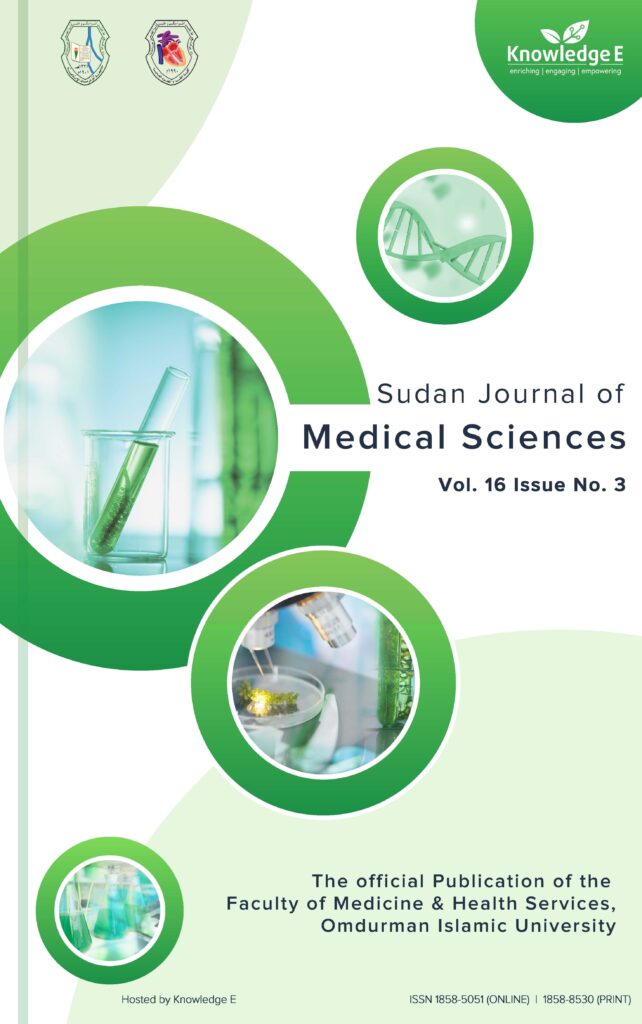
Sudan Journal of Medical Sciences
ISSN: 1858-5051
High-impact research on the latest developments in medicine and healthcare across MENA and Africa
Customized Preliminary Impression: A Novel Impression Technique for Severely Resorbed Edentulous Ridges
Published date:Sep 27 2023
Journal Title: Sudan Journal of Medical Sciences
Issue title: Sudan JMS: Volume 18 (2023), Issue No. 3
Pages:325 - 337
Authors:
Abstract:
Patients with long-term edentulism and/or ill-fitting (poorly fitted) dentures are more likely to experience severe mandibular alveolar ridge resorption. Some of these patients have genial tubercles that rise over the mandibular residual ridge in the anterior region and protrude into the floor of the mouth. Typically, the most prominent portions of the resorbed mandibular edentulous ridge are in contact with the lingual flanges of the mandibular stock impression trays (i.e., genial tubercles and internal oblique lines). In these situations, it is advised that a preliminary custom impression tray be created to pour an initial impression, allowing for the fabrication of individual custom trays. In general, dental practice for the fabrication of the complete denture, the stock trays are used for making the preliminary impression and the custom trays for the final impression. The present article portrays an innovative and efficient clinical technique involving the fabrication of a customized preliminary impression tray for preliminary impression making particularly in unconventional situations, that is, pronounced mandibular alveolar ridge resorption.
Keywords: custom tray, edentulous mandible, individual tray, preliminary impression, residual ridge resorption
References:
[1] Huumonen, S., Haikola, B., Oikarinen, K., Söderholm, A. L., Remes-Lyly, T., & Sipilä, K. (2012). Residual ridge resorption, lower denture stability and subjective complaints among edentulous individuals. Journal of Oral Rehabilitation, 39, 384– 390. https://doi.org/10.1111/j.1365-2842.2011.02284.x
[2] Karnam, S., Basimi, S., Surapaneni, H., Basapogu, S., & Gantala, R. (2015). Severely resorbed edentulous ridges: A preventive prosthodontic approach - A case report. Journal of Clinical and Diagnostic Research : JCDR, 9, ZD17– ZD19. https://doi.org/10.7860/JCDR/2015/15439.6666
[3] Azaria, H. (1972). Elements of removable prosthodontics. Complete Dentures. Thessaloniki, Greece: Aristotle University of Thessaloniki. 52-62,l46-l64,271-288, 292-306.
[4] Azzam, M. K., Yurkstas, A. A., & Kronman, J. (1992). The sublingual crescent extension and its relation to the stability and retention of mandibular complete dentures. The Journal of Prosthetic Dentistry, 67, 205–210. https://doi.org/10.1016/0022- 3913(92)90454-I
[5] Bocage, M., & Lehrhaupt, J. (1977). Lingual flange design in complete dentures. The Journal of Prosthetic Dentistry, 37, 499–506. https://doi.org/10.1016/0022- 3913(77)90162-7
[6] Klein, P. (1971). La peizographie en prothese adjointe mandibulaire. Thesis, Paris.
[7] Kinra, M., Chugh, D., Gowdar, I., Khan, S., Kola, M., & Sachdeva, B. (2016). Making of primary impression made easy for severely resorbed mandibular ridge – A clinical case report. Journal of Advances in Medicine and Medical Research, 19, 1–8.
[8] Jacobson, T. E., Krol, A. J. (1983). A contemporary review of the factors involved in complete denture retention stability and support. Part I. Retention. Journal of Prosthetic Dentistry, 49, 5-15.
[9] Jacobson, T. E., & Krol, A. J. (1983). A contemporary review of the factors involved in complete dentures. Part II: Stability. The Journal of Prosthetic Dentistry, 49, 165– 172. https://doi.org/10.1016/0022-3913(83)90494-8
[10] Jacobson, T. E., & Krol, A. J. (1983). A contemporary review of the factors involved in complete dentures. Part III: Support. The Journal of Prosthetic Dentistry, 49, 306– 313. https://doi.org/10.1016/0022-3913(83)90267-6
[11] Klein, I. E., Goldstein, B. M. (1984). Physiologic determinants of primary impressions for complete dentures. Journal of Prosthetic Dentistry, 53, 611-616.
[12] Aiche, H. (1989). Preliminary functional impression for the mandibular complete denture. The International Journal of Prosthodontics, 2, 543–548.
[13] Kinra, M., Kinra, M., Kalra, A., Nagpal, A., Kapoor, V. (2012). Custom impression trays in prosthodontics- clinical guidelines. Indian Journal of Dental Sciences, 4, 93–95.
[14] McCord, J. F., & Grant, A. A. (2000). Impression making. British Dental Journal, 188, 484–492. https://doi.org/10.1038/sj.bdj.4800516a
[15] Juneja, S., Arora, A., Garg, S. (2013). Creating a denture using customized multi-step approach: A case report. Indian Journal of Dental Sciences, 4, 99–101.
[16] Lott, F., & Levin, B. (1966). Flange technique: An anatomic and physiologic approach to increased retention, function, comfort, and appearance of dentures. The Journal of Prosthetic Dentistry, 16, 394–413. https://doi.org/10.1016/0022-3913(66)90044-8
[17] Shanahan, T. E. (1962). Stabilizing lower denture on unfavorable ridges. The Journal of Prosthetic Dentistry, 12, 420–424. https://doi.org/10.1016/0022-3913(62)90122-1
[18] Madhav, V. N. V., & Desai, P. (2012). Elastomeric impression technique for complete denture impressions. Journal of International Dental and Medical Research, 5, 122– 128.
[19] Anusavice, K. J. (1996). Phillips science of dental materials (10th ed.). WB Saunders Co.
[20] Solomon, E. G. R. (2011). A critical analysis of complete denture impression procedures: Contribution of early prosthodontists in India-part I. Journal of Indian Prosthodontic Society, 11, 172–182. https://doi.org/10.1007/s13191-011-0089-2
[21] Zarb, G. A., Bolender, C., & Hickey, C. (1985). Boucher’s prosthodontic treatment for edentulous patients (6th ed.). Mosby-Year Book.
[22] Neumeier, T. T., & Neumeier, H. (2016). Digital immediate dentures treatment: A clinical report of two patients. The Journal of Prosthetic Dentistry, 116, 314– 319. https://doi.org/10.1016/j.prosdent.2016.01.010
[23] Matsuda, T., Goto, T., Yagi, K., Kashiwabara, T., & Ichikawa, T. (2016). Digitizing system of impression and inter occlusal records for complete denture fabrication. The Journal of Prosthetic Dentistry, 25, 503–509. https://doi.org/10.1111/jopr.12375
[24] Rignon-Bret, C., Dupuis, R., & Gaudy, J. F. (2002). Application of a 3-dimensional measurement system to complete denture impressions. The Journal of Prosthetic Dentistry, 87, 603–612. https://doi.org/10.1067/mpr.2002.124204
[25] Infante, L., Yilmaz, B., McGlumphy, E., & Finger, I. (2014). Fabricating complete dentures with CAD/CAM technology. The Journal of Prosthetic Dentistry, 111, 351– 355. https://doi.org/10.1016/j.prosdent.2013.10.014
[26] Zhang, P., Li, W., Wang, Y., Pan, S., & Sun, Y. (2016). [Multi-source data acquisition technology in the restoration of the complete denture restoration]. Chung-Hua Kou Chiang I Hsueh Tsa Chih Chinese Journal of Stomatology, 51, 124–128.
[27] Alghazzawi, T. F. (2016). Advancements in CAD/CAM technology: Options for practical implementation. Journal of Prosthodontic Research, 60, 72– 84. https://doi.org/10.1016/j.jpor.2016.01.003